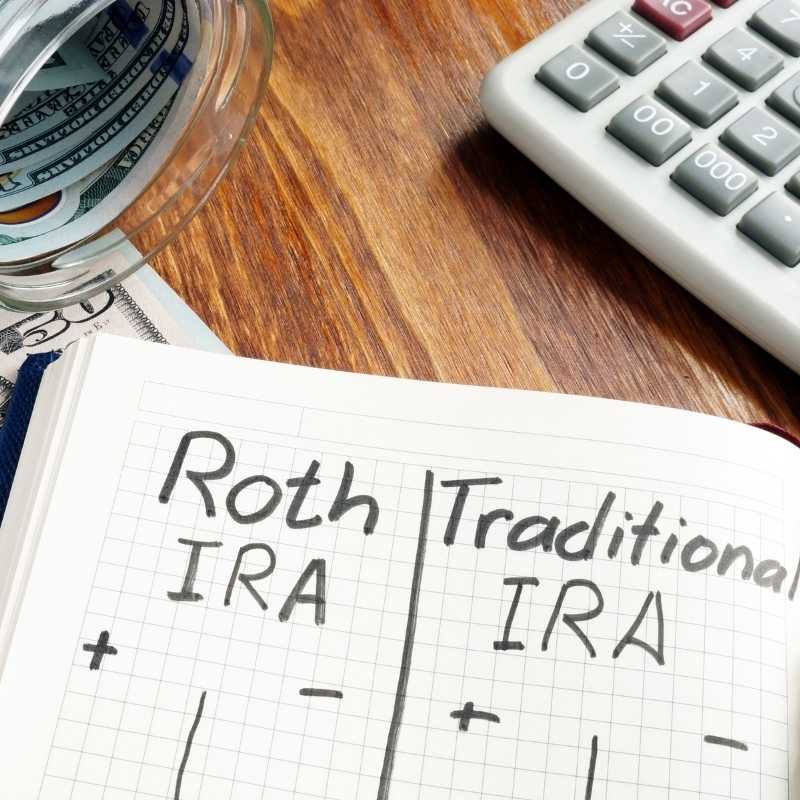You may be wondering which type of IRA you should contribute to: a traditional one or a Roth? Here's the difference between the two and how your contributions will affect your taxes.*
Traditional IRA
A traditional IRA lets you take advantage of tax benefits now instead of in the future. With a traditional IRA, you're typically allowed to make either pre-tax or after-tax contributions depending on income requirements and filing status (see below), and your contributions will grow tax-deferred. Your contributions may be deductible on your taxes, offering you some immediate tax benefits, but there are income limitations if you contribute to your company's 401(k) plan. Anyone with earned income can contribute to a traditional IRA and there are no age or income restrictions for contributing. After the age of 59 1/2, any withdrawals will be be taxed as income and you must start withdrawing from the account after age 72.
The key point to remember about a traditional IRA is that a tax deduction can only be taken for the amount of each contribution. When you go to withdraw the money years down the road, you'll need to pay taxes on every dollar of your accumulated contributions and any of the associated gains that have accrued from those contributions. This is quite different from a Roth IRA, as you will see.
A traditional IRA is a good choice for someone who expects to be in the same or lower tax bracket when they retire.
Roth IRA
A Roth IRA, on the other hand, lets you take tax-free withdrawals in the future. How? Because you make your contributions with after-tax dollars and you are not allowed to deduct them on your taxes. Like the traditional IRA, Roth IRA contributions grow tax free and there are no age restrictions to contributing, but unlike the traditional IRA, you can only contribute to a Roth with earned income below a certain level (see below). Withdrawals are penalty- and tax-free after five years and age 59 1/2 with no mandatory distributions.
The key takeaway with the Roth IRA is that you'll pay no taxes on your contributions and all of the associated gains that have accrued when you make your withdrawals, unlike the traditional IRA.
This means that a Roth IRA can be a good choice for someone who expects to be in a higher tax bracket when they retire.
Contribution Limits
The Internal Revenue Service has set contribution limits to traditional and Roth IRAs for 2020.
Your total annual contributions to both combined cannot exceed $6,000 if you're under 50 or $7,000 if you're over 50 (the IRS allows an extra $1,000 for those over 50 as a "catch-up" amount).
There are filing status and income requirements for a Roth IRA to consider. For example, if you're a single filer with a modified adjusted gross income (AGI) of under $124,000, you can contribute the full limit for your age. However, you can only partially contribute if you make between $124,000 and $139,000 modified AGI, and you can't contribute at all for a modified AGI greater than $139,000. The Internal Revenue Service has a list of IRA contribution limits based on income and filing status here.
As we mentioned above, if you contribute to your employer's 401(k) plan, you may not be able to deduct your traditional IRA contributions. For example, if you're single or head of household and your AGI is $65,000 or less in 2020, you can take a full deduction up to the amount of your contribution limit. If your AGI is more than $65,000 but less than $75,000, you can take a partial deduction. But if it's over $75,000, there's no deduction. For a chart of deduction limits based on filing status, visit the IRS's worksheet here.
Many 401(k) plans now offer a choice between traditional and Roth IRA contributions. Income limits do not apply in case of a 401(k) plan, and you can usually split your contributions between the two plans. Employer contributions to retirement plans are always put in the traditional side of the ledger, and they and their associated gains will be taxable upon withdrawal.
Some people prefer to use a combination of traditional and Roth IRAs to give them some tax deductions now and tax flexibility in their retirement years. Current and expected tax rates in retirement should be considered, and you should consult a tax professional with questions about which choice or combination is right for you.
For help making the right retirement investment decisions, contact Hanscom Investment Services.† Call 800-656-4328, ext. 2236 to set up a free consultation with a financial consultant.
*The content is developed from sources believed to be providing accurate information. The information in this material is not intended as tax or legal advice. Please consult legal or tax professionals for specific information regarding your individual situation.
- 3 Surprising Regulations That Affect Your Finances
- How to Save on Property Taxes
- Are Americans Prepared for Retirement
- Scam Alert: Watch Out for Subscription Renewal Fraud
- An Age-by-Age Guide to Saving for Retirement
†Securities and advisory services are offered through LPL Financial (LPL), a registered investment advisor and broker-dealer (member FINRA/SIPC). Insurance products are offered through LPL or its licensed affiliates. Hanscom Federal Credit Union is not registered as a broker-dealer or investment advisor. Registered representatives of LPL offer products and services using Hanscom Investment Services, and may also be employees of Hanscom Federal Credit Union. These products and services are being offered through LPL or its affiliates, which are separate entities from, and not affiliates of, Hanscom Federal Credit Union. Securities and insurance offered through LPL or its affiliates are:
Not Insured by NCUA or Any Other Government Agency / Not Hanscom Federal Credit Union Guaranteed / Not Hanscom Federal Credit Union Deposits or Obligations / May Lose Value













Comment